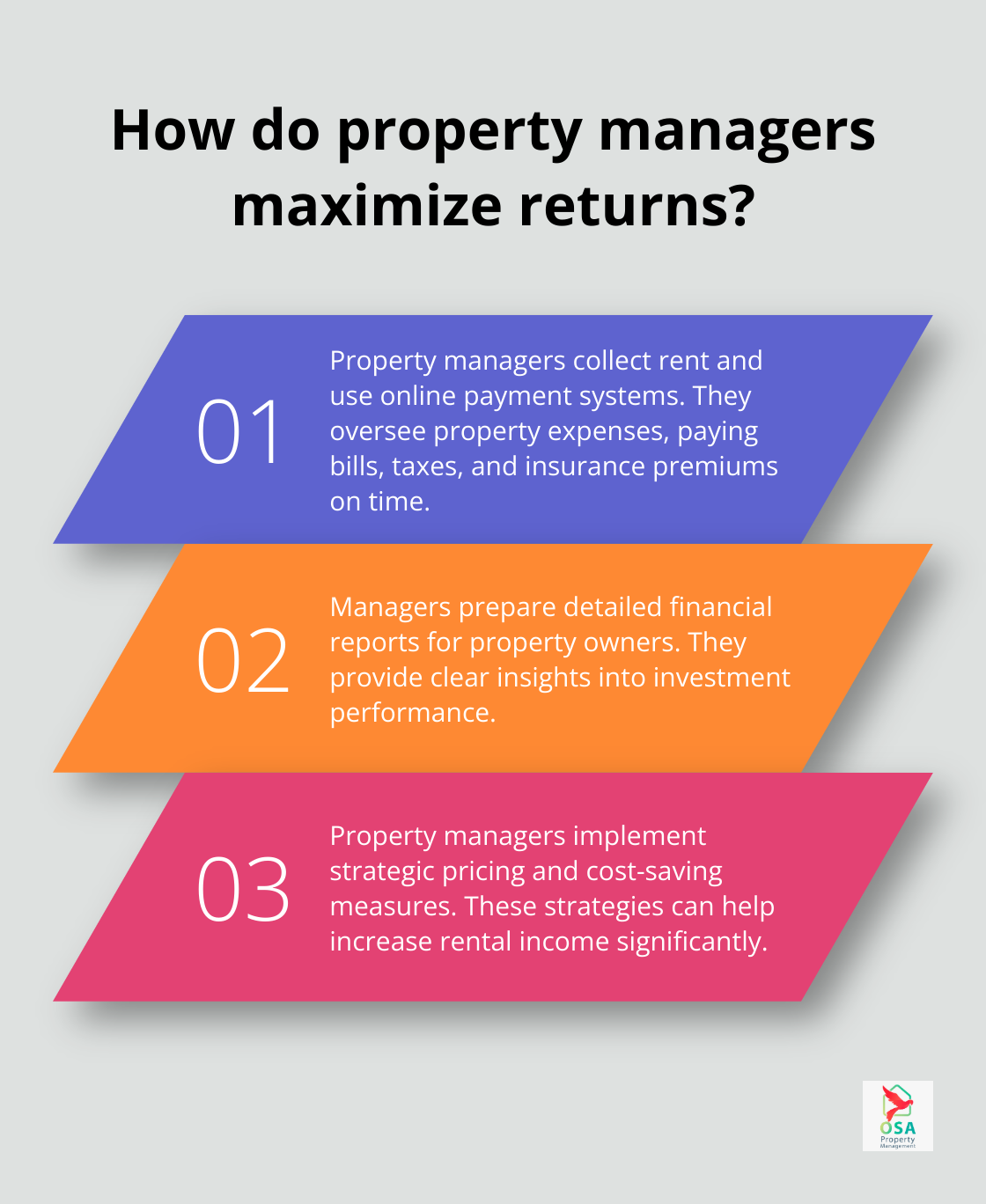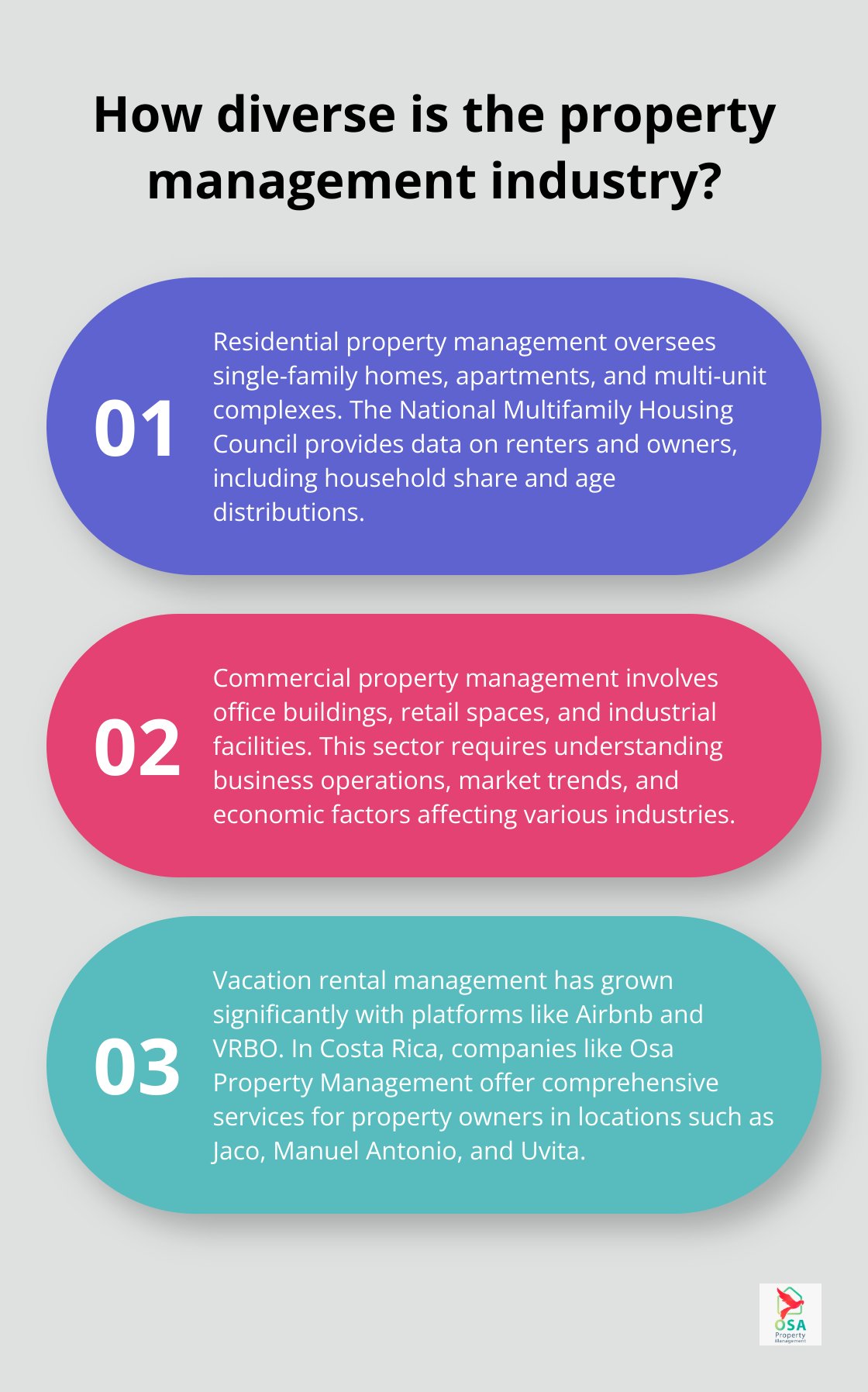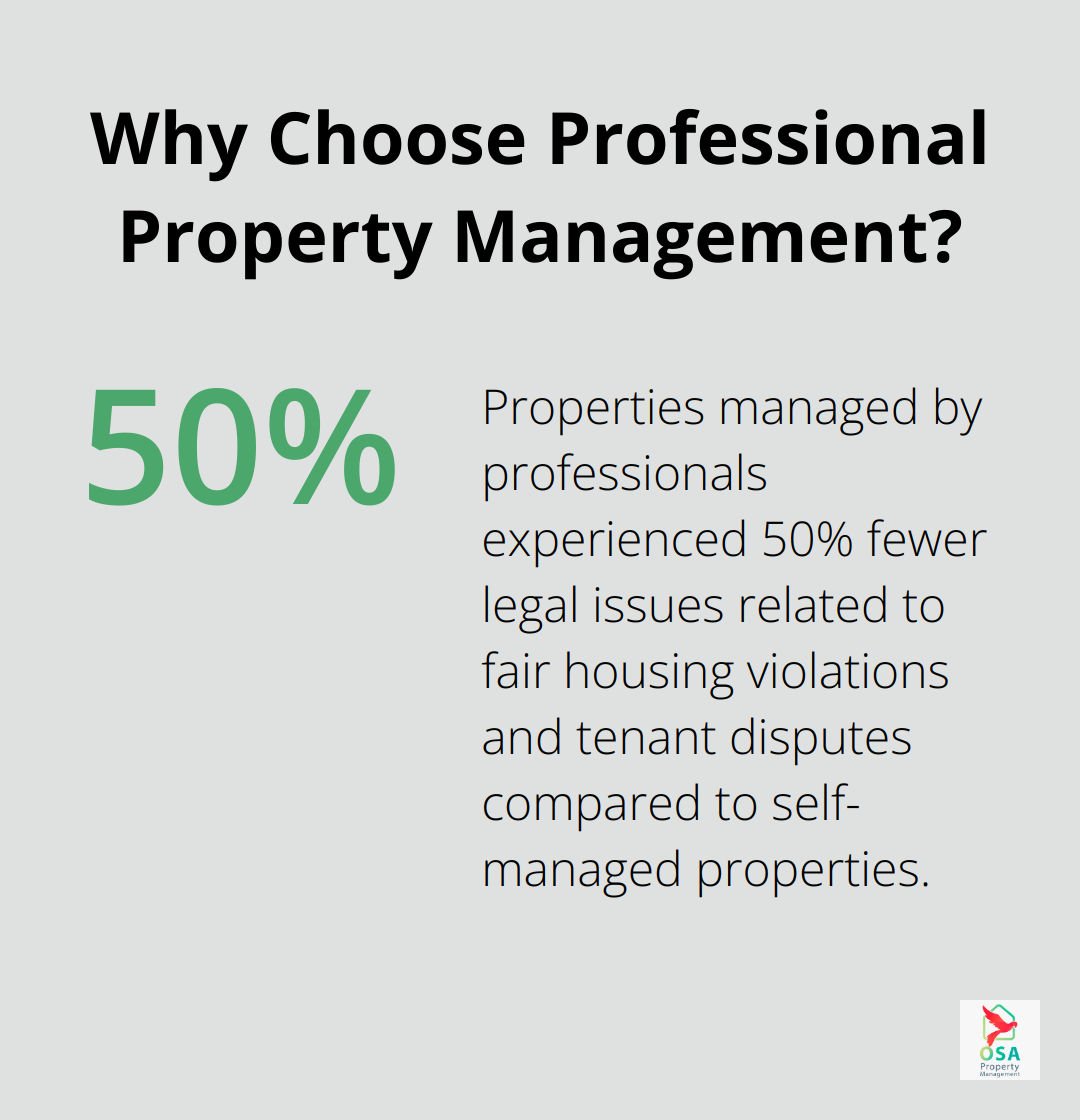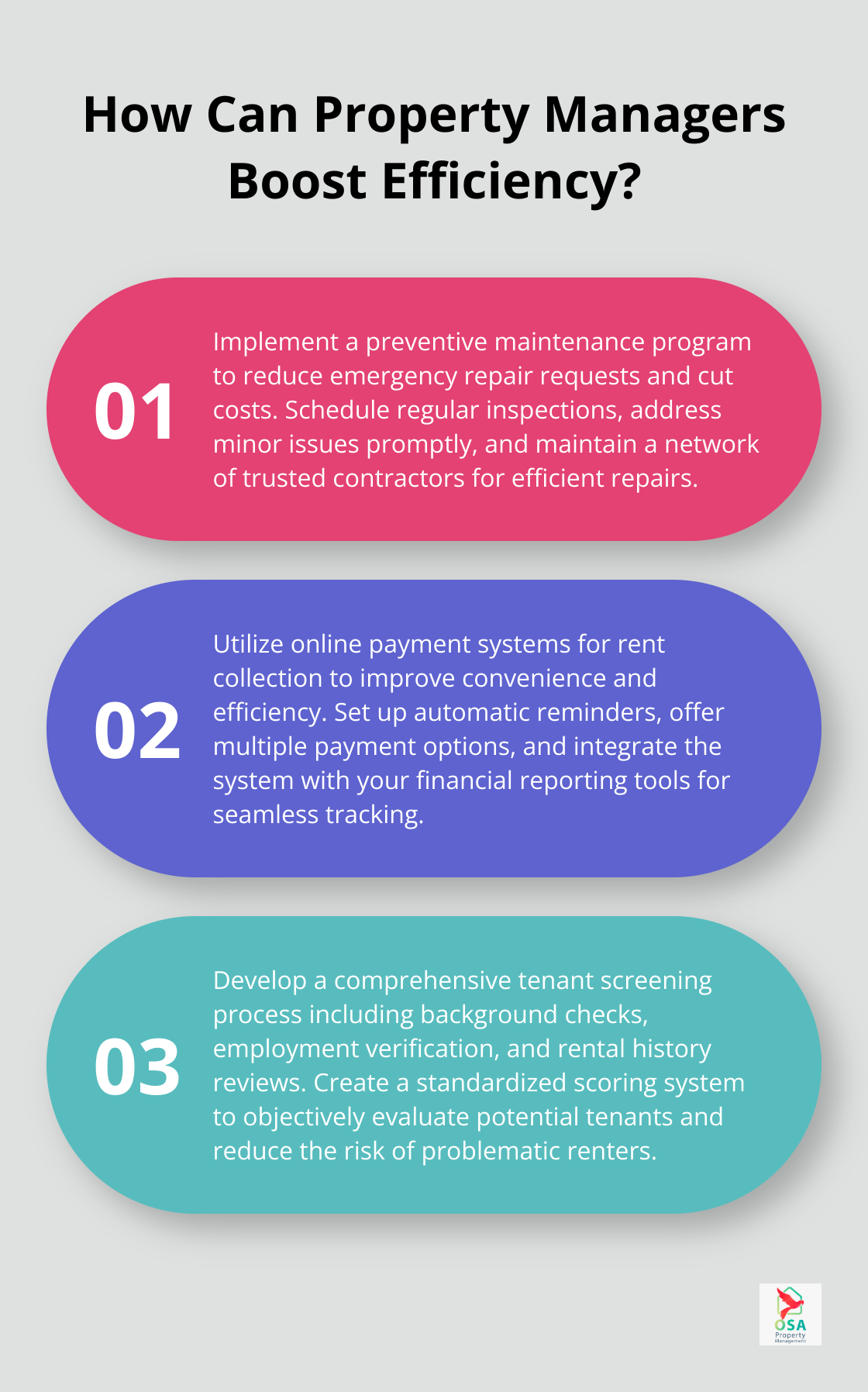Property management is a multifaceted field that plays a vital role in the real estate industry. At Osa Property Management, we understand the complexities involved in overseeing properties on behalf of owners.
This comprehensive overview will provide a clear property management description, covering key responsibilities, types of management, and the benefits of professional services. We’ll also explore future trends shaping this dynamic industry.
What Do Property Managers Actually Do?
Property managers perform a wide range of tasks to ensure properties are well-maintained, profitable, and compliant with local laws. Their responsibilities extend far beyond rent collection and maintenance issues. Let’s explore the key aspects of a property manager’s role.
Finding and Retaining Quality Tenants
Property managers excel at tenant management. They market properties effectively, screen potential tenants, and select the best candidates. This process involves thorough background checks, employment and income verification, and reference checks. The National Association of Realtors offers useful information concerning leases, safety and security, marketing, and maintenance, and risk management for commercial properties.

After tenants move in, property managers handle all communication, address concerns promptly, and work to maintain positive relationships. This approach often leads to high tenant satisfaction rates and reduced turnover.
Managing Finances and Maximizing Returns
Financial management stands as a critical aspect of property management. Managers collect rent, often using online payment systems for convenience and efficiency.
Property managers also oversee property expenses, paying bills, taxes, and insurance premiums on time. They prepare detailed financial reports for property owners, providing clear insights into investment performance. Through strategic pricing and cost-saving measures, property managers can help increase rental income significantly.
Maintaining Properties to Preserve Value
Regular maintenance and prompt repairs are essential for preserving property value and tenant satisfaction. Property managers coordinate routine inspections, preventive maintenance, and emergency repairs. A network of trusted contractors allows them to address issues quickly and cost-effectively.
Many property management companies implement preventive maintenance programs that significantly cut emergency repair requests.
Navigating Legal and Regulatory Landscapes
Property management involves complex legal and regulatory requirements. Managers stay up-to-date with local, state, and federal laws affecting rental properties (including fair housing regulations, eviction procedures, and safety standards).
They handle all necessary documentation, from lease agreements to maintenance records. Attention to detail in this area helps clients avoid costly legal issues.
As we move forward, it’s important to recognize that property management isn’t a one-size-fits-all service. Different types of properties require specialized approaches and expertise. Let’s explore the various types of property management in the next section.
Types of Property Management: Exploring Diverse Sectors
Residential Property Management
Residential property management encompasses the oversight of single-family homes, apartments, and multi-unit complexes. This sector requires a thorough understanding of local rental markets and tenant needs. The National Multifamily Housing Council provides data on renters and owners, including the share of households and residents that rent vs. own, as well as age distributions of U.S. renter/owner households.

Managers in this field must excel at tenant screening, rent collection, and maintenance coordination. They also need to stay informed about local housing laws and regulations. In Costa Rica, for instance, property managers must familiarize themselves with the country’s specific rental laws and cultural norms to effectively serve both property owners and tenants.
Commercial Property Management
Commercial property management involves the oversight of office buildings, retail spaces, industrial facilities, and other business-oriented properties. This sector demands a unique skill set compared to residential management, as it often involves interactions with corporate tenants and more complex lease agreements.
Managers in this field must understand business operations, market trends, and economic factors affecting various industries. They often collaborate closely with property owners to develop strategies for attracting and retaining high-quality tenants.
Vacation Rental Management
The vacation rental management sector has experienced significant growth in recent years, particularly with the rise of platforms like Airbnb and VRBO. This type of management requires a unique blend of hospitality skills and property management expertise. Managers in this sector must handle frequent guest turnovers, maintain high cleanliness standards, and often provide concierge-like services.
In popular tourist destinations like Costa Rica, vacation rental management holds particular importance. Companies like Osa Property Management excel in this area, offering comprehensive services for property owners in locations such as Jaco, Manuel Antonio, and Uvita. These services include property marketing, guest satisfaction management, and day-to-day operations, which allow owners to maximize their rental income without the associated stress.
Association Management
Association management focuses on overseeing homeowners associations (HOAs) and condominium associations. This specialized form of property management involves maintaining common areas, enforcing community rules, and managing finances for entire neighborhoods or buildings.
Managers in this field must possess strong communication skills and the ability to mediate conflicts between residents. They also need to understand complex legal and financial matters related to community governance.
Industrial Property Management
Industrial property management centers on overseeing warehouses, manufacturing facilities, and distribution centers. This sector requires knowledge of specialized equipment, safety regulations, and logistics operations.
Managers in this field must ensure that properties meet the unique needs of industrial tenants, which often include features like loading docks, high ceilings, and heavy-duty electrical systems. They also need to stay informed about zoning laws and environmental regulations that affect industrial properties.
The diverse nature of property management necessitates specialized knowledge and skills for each sector. Whether it’s residential, commercial, vacation rental, association, or industrial management, each type presents unique challenges and opportunities. As the real estate landscape continues to evolve, real estate investors and developers should be poised for an upturn in industry trends as the post-pandemic disruption abates and positive cyclical forces gain momentum.
Why Professional Property Management Pays Off
Streamlined Operations and Stress Reduction
Professional property management offers significant advantages that impact a property owner’s bottom line and overall experience. The primary benefit is the considerable time and stress savings for property owners. Managing a rental property involves numerous time-consuming tasks, from marketing and tenant screening to maintenance coordination and rent collection. Professional management allows property owners to focus on their core business or personal pursuits.
Property management saves time and money in real estate property. This time savings translates to reduced stress and improved quality of life for property owners.
Optimized Rental Income and Occupancy Rates
Professional property managers possess the expertise and market knowledge to maximize rental income while maintaining high occupancy rates. They use sophisticated pricing strategies based on local market trends, property features, and seasonal demand fluctuations.
Expert Navigation of Legal and Regulatory Complexities
The rental property landscape presents numerous legal and regulatory challenges that can overwhelm individual property owners. Professional property managers stay up-to-date with local, state, and federal laws, ensuring compliance and minimizing legal risks.

A survey conducted by the National Apartment Association found that properties managed by professionals experienced 50% fewer legal issues related to fair housing violations and tenant disputes compared to self-managed properties. This reduction in legal exposure can lead to significant cost savings and peace of mind for property owners.
Efficient Maintenance and Repairs
Professional property managers maintain strong relationships with reliable contractors and service providers. This network allows them to address maintenance issues quickly and cost-effectively. Regular inspections and preventive maintenance programs (often implemented by professional managers) can significantly reduce emergency repair requests and overall maintenance costs.
Enhanced Marketing and Tenant Screening
Property management companies employ effective marketing strategies to attract high-quality tenants. They utilize various channels (including online platforms and local networks) to reach a wider pool of potential renters. Professional managers also conduct thorough tenant screenings, which include background checks, credit reports, and rental history verifications. This process helps reduce the risk of problematic tenants and ensures a more stable rental income.
Final Thoughts
Property management encompasses a wide range of responsibilities, from tenant screening to legal compliance. Professional property managers save time, reduce stress, and maximize rental income for property owners. They navigate complex legal landscapes and implement efficient maintenance programs to protect investments.

The property management industry will evolve with technological advancements and changing market demands. Sustainability and energy efficiency will become more important, while remote work may reshape commercial property management. These trends will influence how property managers approach their roles and adapt to new challenges.
Osa Property Management offers expert services for property owners in Costa Rica. With extensive experience and local market knowledge, they provide comprehensive property management solutions (tailored to the unique needs of the region). Their services aim to maximize investment potential and offer peace of mind to homeowners.

